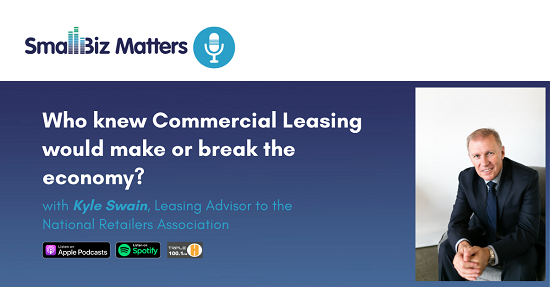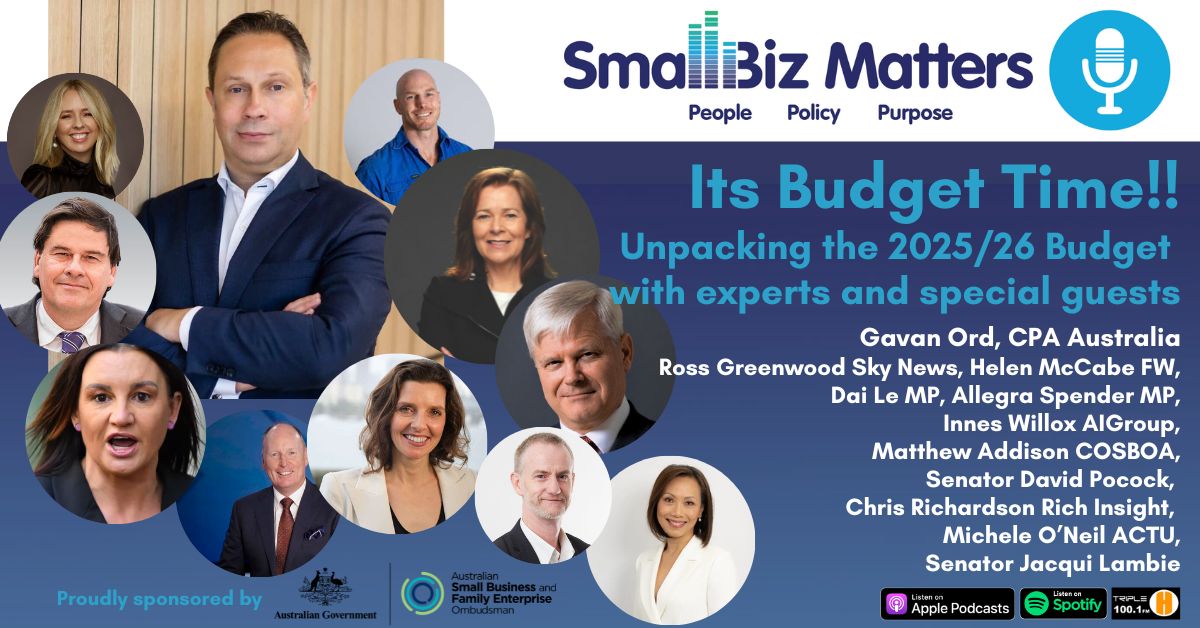Who knew Commercial Leasing would make or break the entire economy?
| Tuesday August 4Small Biz Matters – Providing the small business community with educational content and advocacy since 2014
with Alexi Boyd, broadcaster, advocate and small business owner.
Date: 4 August 2020
When the chips are down you need a peak body on your side. And boy are the chips down right now.
Right now small, medium and even large retailers are losing income and purging employees to the point of no return. And their biggest overhead? Commercial Rent. And suddenly, the Code of conduct is everyone’s business. What are the Small business owner’s rights and the landlord’s responsibilities? What is mandated and what is inferred? Which level of government administers and is policing the protections?
And importantly; who can you turn to for help?
Right now the National Retail Association is flooded with queries about what has been mandated. Kyle Swain is the Leasing Advisor to the National Retailers Association and has been in the room supporting and negotiating for you and your business so we’ve brought him on Small Biz Matters to help you understand the changes.
Topics we’ll be covering:
Background - The creation of the National Cabinet Code of Conduct and the SME Commercial Leasing Principals
How did the code of conduct come about and who did the National Cabinet consult when it was created?
- What is it’s intent?
- Administration committee (a group of advisors in this case made up of 4 peak bodies) gave info to National Cabinet.
- National Retail Association’s advisor contributed to the guiding principles for the agreement to protect the tenants
- Then the States give effect to the code through legislation. So some states were quick to act and others slow to implement the desperately needed change.
- It is a mandatory National Code of conduct but many landlords wouldn’t act until the legislation actually assented in each state.
So how does this work for business owners who have multiple locations across multiple states?
- What’s the main difference between the states?
- Confusion around the different data required by landlords in each state
Now: what’s the current impact on small business?
You mentioned you’ve had a big increase in businesses seeking information about the Code of Conduct to achieve rent relief and understand what their requirements are.
- There is a lot of grey area and it’s very open to interpretation. It’s not robust enough.
- How tough is it out there? It’s not just the Mum & Dad small-scale operators; the participants are across the board in terms of size
- How important is this code of conduct to keeping businesses alive?
What about the big boys: Westfield etc. What’s your report card on them?
- It’s the landlords who have, over a number of years, pushed “market rents” to a level that is unsustainable for SME’s and resulted in such a large percentage of tenants and occupiers of real estate, whether it’s a retail premises, a commercial office space or a warehouse, who don’t have 3-6 months of cashflow in the business to survive a sustained downturn such as a pandemic. For many, particularly in retail, even 1 month of having to close the business and receiving no revenue, even if 50% of the rent is waived, will result in financial failure,... and we’re seeing that in small numbers already, and expect to see it in huge numbers after JobKeeper ends.
- So my report card on landlords generally is that the bigger ones are certainly fulfilling their minimum obligations under the Code, but not really doing enough to fulfil the ‘intent’ of the code and I fear they will suffer the impact of that for the next 3 or 4 financial years rather than having 1 bad year.
The future: The continuing negotiation process between peak bodies & government across different scenarios
- The ‘reasonable recovery period’ - why is it important to understand what the definition of this period is?
- Returning to the two versions of “normal” - with or without the vaccine
- How dependent is the industry on Jobkeeper and why is it important to remember the impact it’s removal will have?
- With Jobkeeper now extended, will the Code of Conduct also be extended? And do we know what’s going to happen after this Code of Conduct period ends?
How can small businesses improve the negotiation process?
Where can those affected small businesses go for help?
- Peak bodies
- Webinars and understanding the legislation
- Know your rights, know where to go for help, educate to understand your requirements. Peak bodies can also support in the mediation process on the side of the small business
- Small business commissioners at state level & ASBFEO
To find out more :
The National Cabinet Mandatory Code of Conduct - SME Commercial Leasing Pricipals - https://www.pm.gov.au/sites/default/files/files/national-cabinet-mandatory-code-ofconduct-sme-commercial-leasing-principles.pdf
About our Guest:
Kyle is the Retail Director for LPC Cresa who were founded in 1993 and are now one of Australia and New Zealand’s’ leading, independent, tenant-only leasing and property advisory businesses, and part of the global Cresa group.
Lpc Cresa advises office, retail and industrial tenants exclusively across every stage of the property lifecycle and seek to level the playing field when negotiating with landlords and developers to ensure tenants achieve the best possible outcomes.
Lpc Cresa has built a reputation as the preferred problem solver among occupiers of real estate through their unwavering commitment to providing tenants with professional, high quality and independent property advice.
As the Retail Director, Kyle is passionate about helping retailers improve their bottom line through strategically aligned property outcomes and has particular expertise in optimising lease portfolios.
Kyle has post graduate degrees in both Property Economics and Business Administration and a solid background in retail management having worked for major Australian retail brands including Coles Myer Group before entering the property industry.
Kyle has been the Leasing and Tenancy Advisor to the National Retail Association since 2017, providing advice and representation to Australia’s most representative retail industry association with more than 24000 shopfronts nationwide, positioning Kyle as leader in tenant-side retail leasing, tenant representation and retail advisory services.
In his spare time, Kyle is a Childhood Cancer Awareness advocate and avid cyclist, riding 250-300km per week before most of us even get out of bed.





